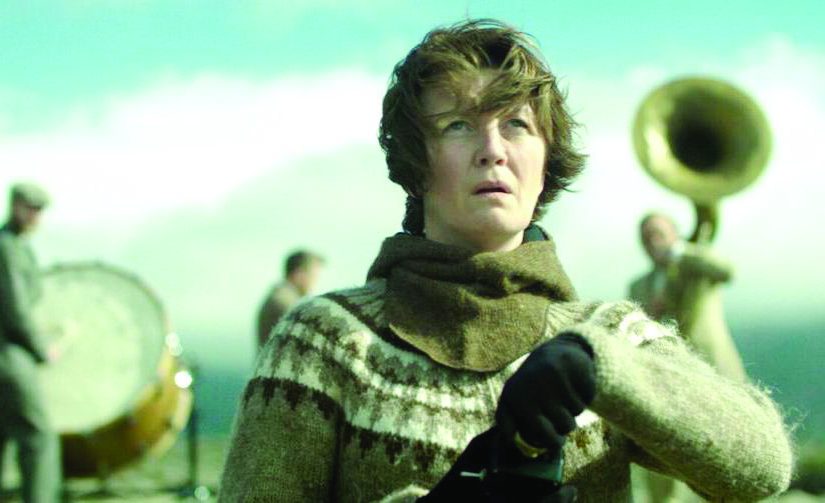A still from ‘Woman at War’ directed by Benedikt Erlingsson…gutsy fight to save ecology of Iceland
By Pankajbala R Patel
IFFI films are the ultimate extra special class-room of life!
ON a scale of one to 10 if anyone were to ask me about IFFI 2018 I would say, selection of films was 10 in 10. Systems and good manners in place or not for peaceful viewing of films — take five in 10. There’re petty battles within wars going in the ESG/DFF/etcetera bureaucracies and mindsets.
Forget systems in place, the fact remains that most cine lovers in small town Panaji like to catch the bouquet of the best of Indian and films from other countries west and east. I am no exception. Very little can keep me at home or in the office when IFFI is in town, but then I’m a privileged IFFI-goer because for one thing I reside in Panaji (it’s easier for me to catch films in a jiffy); another thing, it helps to be part of the media fraternity even if mainstream media people can rarely make time to see more than a handful of films unless they’re exclusively editors who’re cinema buffs or film critics on the job of reviewing festival films for print or electronic media. In recent times, film bloggers of variegated denomination too are enjoying name and fame and given special privileges at film festivals.
One of these days I tell myself I must learn to do a blog of my own! It’s never too late to catch up with earning some more money because the old adage of no money, no life is only too true. My quota of films at IFFI is usually about 15 to 20 films and if I see an exceptionally good film I’m exhaustively happy enough for the rest of the day if I see no more films. Some young IFFI-goers may catch films back to back, all six and more screenings per day…but retain very little (ask them later what a film was all about and most will be scratching their head).
Don’t know about you but seeing too many films at breakneck speed one after another makes me feel like a zombie character revolving through a filmi gate trapped in one film or another, crowding mind space which is not infinite no matter who says what…software may be infinite, hardward is finite! Whiling away time in the darkness of an auditorium waiting for a drag of a film can spoil an entire day if it’s a morning screening!
I don’t do much homework about which films to see and more or less depend on my friends coming in after the MAMI festival in Mumbai to clue me up about films not to miss, apart from my gut instinct sometimes…then it is a fact that I will see any film with the word “tree” in it (say the Turkish film `The Wild Pear Tree’ and don’t know why I missed `When the Trees Fall’). Of course, without some homework it’s hard to tell whether a film will be rewarding or not despite rave reviews, like just about everybody told me, “Don’t miss Gaspar Noe’s French film `Climax’ at any cost!”
WHAT Union Minister of State for Tourism K J Alphons said about being addicted to films from his boyhood days echoes in the hearts of most Indians and I dare say films make for the best very special classrooms of them all in times past, present and future. Cinema has to be the most popular medium of education-cum-entertainment. Most of us accept that and know that cinema history is distinguished and evergreen as a tool for survival (thank you Mr Alphons for this observation).
This IFFI I caught about 14 films, starting off with `Dovlatov’ (Russian film directed by Aleksei German Jr, the film is all about life in Russia in the 70s for creative artists who like to see the truth as ground reality and not bits of rosy fiction painted by the government of the day) and ending with the terribly down-to-earth Korean director Kim Ki-duk’s `Human, Space, Time and Human’. Sorry, I didn’t see a single Indian film!
We need an exclusive national festival for Indian cinema alone for it is one heavyweight industry. Of course both Indian and International cinema needs to go to every classroom in our educational institutions. Isn’t it high time students in our public and private schools/colleges have a special weekly/monthly day to do nothing but see/talk films for free and freely? If this is not already happening it is a real shame.
A recurring thought viewing many of the films coming out of the European World War I & II experiences from the countries of the West always make me feel how lucky and blessed we are in India! I mean, even the climate is on our side. That is if we accept that good cinema will reflect life’s realities and we see how people survive or don’t survive in the post-Russian history countries or the countries around the Baltic sea…there are still a large number of films coming from the German Nazi experience in Germany, Poland, France and we get an idea of under what duress a people live when tyrannical or brutal dictatorships take over a country and manipulate, brainwash, kill their own people in the name of god, race, colour, politics.
In ‘Dovlatav’ one may not even think beyond the lie or promise hyped up by government agencies and one may not even depict reality to the contrary…the truth? When the truth is banned officially what happens unofficially? The artistes of the soul commit suicide or die or varnish into oblivion and we are the poorer for it. A slow, more than two hours long but extremely insightful film is `Dolotsav.’
ASK me about the films which remain etched in my mind. I’d say it’s Nuri Bilge Ceylan-directed Turkish film `The Wild Pear Tree’ which details the story of a young, passionately literary-minded Sinan, who has to come to terms with the shortcomings of his family — a philosophical father who’s a teacher but addicted to gambling precious money, a mother whom he dedicates his first novel to… the hunt for water to farm the land is as perennial as the hope for achhe din. We learn the fruit of a wild pear tree (or the fruit of any wild tree) may not look perfect but tastes deliciously nutritious, a wild fruit can be such a wonderful analogy for life! It’s a layered film offering many lessons in growing up to tolerate the good with the bad but to try to play the game of life to make a difference for the better regardless of which religion your god belongs to.
Pawel Pawlikowski’s `Cold War’ is a love story which continues to bloom against all odds in the ruins of post-war Poland, against the backdrop of the Cold War of the 1950s across Poland, Berlin, Yugoslavia, Paris. The state makes life repressive, oppressive, difficult, but for the two music makers the view is always better on the other side and they keep looking for it. Exquisite love story.
`Woman at War’ is the dynamic fight of Halla (and her friends) who lives a double life saving her beautiful Iceland, an Iceland with hot spring mountain country, from being ruthlessly corporatised by a Japanese aluminium company courtesy a government which should know better. Funny, I caught this film by fluke, a last minute switch for which I’m grateful!
More about Kim Ki Duk’s film from South Korea titled `Human, Space, Time and Human.’ It’s a blow-by-blow rationale of what happens when there is a food shortage aboard a ship which has come to a stop mid-air — a chilling saga of human survival as various groups representing good, bad and ugly clash, compromise, learn anew what the law of the jungle is all about if not tempered by disciplining the gross senses (vis-à-vis food, sex, power)…hey, it’s a long, long, rocky route back to life’s garden of paradise if that’s the destination you’re seeking.
Hirokazu Kore-eda’s `Shoplifter’ is a thorough heart-warmer about an assorted “family’ living off petty crime; `Lemonade’ (a film from Romania by Ioana Uricaru) is full of ironies, all about a nurse, a mother who migrates to the USA in search of greener pastures but learns bitterly that there are no greener pastures, life is a hustle to survive but she has to give her young son an education. IFFI’s opening film, Julien Landais’ `The Aspern Papers’ is set in Venice, a philandering poet, a trusting woman in love who struggles to hide the truth about her life; reportedly based on the good life the Romantic poets Lord Byron

and Shelley lived while holidaying in Europe, a film worth viewing.
The much recommended French film `Climax’ is as much a horror as revealing film about what happens when someone spikes the sangria at a dance rehearsal party with LSD. A hallucinatory nightmare of a film I could have skipped! I missed the unusually filmed police thriller `Guilty’ (from Denmark), and was doomed to miss even the second screening because I arrived a little late for the show.
(Sigh) Other worthy films I could have seen if I’d organized myself better: `The Pigeon’ (Banu Sivaci-directed film from Turkey),`The Bra’ , `Birds of Passage’, `Wild Strawberries’ …may there be another time to catch up with these, especially since nowadays one does not have to wait for IFFI to see a film out of the commercial framework or so to speak.
THERE are several places in Panaji where one may catch up with films. For example, one may join ESG’s Cine Club to see a film a week (Thursdays); or go up to Sunaparanta, Altinho, where a choice selection of films are screened regularly for members. The Museum of Goa out at Pilerne also schedules the screening of films and in fact, there’re several venues now in Goa where one my catch up with the joy of cinema past, present and futuristic…as opposed to mainstream cinema of mass appeal on which fortunes are made and lost.
Even then I do believe that a lot is changing in the ways in which we prefer to seen a film, be it in private or semi-privacy or in public setting! Khaas aadmi likes to see films in the comfort of their own home, aam aadmi depends on television and private social clubs for a small price. Whatever, as long as we continue to make and see films to stay alive and kicking or just to survive in a world seeking happiness but fixing sadness all around for humankind and Mother Earth.
